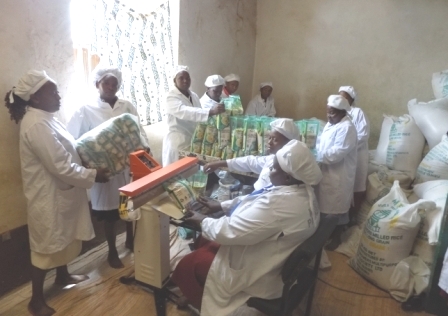In order to break into the complex local and international agricultural production and marketing chain, Kenyan farmers are increasingly finding, forming or joining co-operatives, to reach more markets with better prices and grow their incomes.
According to a 2016 survey of 17 co-operatives with a combined membership of over 200,000 by Kenya Market Trust (KMT) which works to sustainably improve the lives of Kenyans by transforming its key market systems agriculture, co-operatives play a crucial role in enhancing productivity and marketing of smallholder farmers produce.
Since the early 1950s when African smallholder farmers fought for the right to organize and were finally allowed, co-operatives have grown to have several retail outlets and present a good opportunity for members.
For Machakos Cooperative Union (MCU) which was established in 1964 and currently housing 108 affiliated primary organizations serving over 60,000 individuals of which majority are farmers, the main objective was to market coffee for the producers within the larger former Machakos District but as the years passed, it became necessary to incorporate other forms of farmers’ organizations in the union membership to increase their production and marketing strength.
“We support members through the production, processing, local and global marketing of their diverse, high quality agricultural and handicraft products that include coffee, cotton, dairy, horticulture, and handicraft among others,” said Martin Malila, MCU CEO.
He says that through the cooperative, members are able to get trainings, linkages to financial institutions for credit facilities, subsidized farm inputs, networking with local and international partners and certification to be able to market without restrictions in all markets.
RELATED CONTENT: Kuresoi farmer saves Sh6000 monthly by selling milk to a cooperative
Machakos Cooperative Union (MCU) officials showing their trophies during farmers’ past event in Nairobi. Photo courtesy.
Among other organisations which has certified MCU to trade in Africa and globally include World Fair Trade Organization (WFTO) to trade in in handicrafts and Fair-Trade Africa (FTA) to trade in coffee. This ensures that MCU members adhere to the code of practice such as fair pricing for products, accountability and transparency.
“Currently, the cooperative has 26 women groups that produce stylish sisal baskets (as well as sisal plates, tablemats, hats, floor mats, etc.), which MCU markets internationally. We also help in coffee value addition and marketing of its affiliate’s product internationally and through the coffee exchange,” said Malila.
RELATED CONTENT: Embu cooperative group turns farmers into net suppliers
MCU serves farmers from Kangundo, Mwala, Yatta, Kathiani, Matungulu, Masinga, AthiRiver, Makueni, Kalama, Mbooni East, Mbooni West,Kaiti, Kibwezi East, Kibwezi West and Kilome
Other farmer cooperatives have gone through numerous transformations over the years in order to suit members’ needs which include accessing various resources, processing of farmers’ produce and marketing.
Mwea Rice Growers Multipurpose Co-op. Society Ltd (MRGM) is an example of cooperatives that have undergone some vital changes. The coop was first registered in 1964 as Mwea Irrigation License thrift co-operative society and later changed to Mwea Tebere Savings and Credit Co-operative Society Ltd.
RELATED CONTENT: Cooperative model connects farmers to supermarkets
In 1983 it amalgamated with a sister Society under the Mwea Amalgamated Rice Growers Co-operative Society Ltd but later in the year split into two; Mwea Rice Farmers Sacco and Mwea Rice Growers Multipurpose Co-operative Society which is a marketing Society.
“At MRGM we arrange for efficient handling, processing, grading, transportation and marketing of members produce on their behalf. In this, we carry out business in a profitable manner and pay divided to members for their investment,” said Joseph Ndungu, MRGM chairperson.
To ensure that farmers meet production quality and quantity, the cooperative mobilise resources, borrow on behalf of members, give members credits, assist members in land preparation, advise farmers on best rice agronomical practices and subsequently look for a competitive market for a better price for members’ produce.

Mwea Rice Growers Multipurpose Co-operative Society workers packaging and branding rice at the society’s processing plant-Kirinyaga County.
Currently, the coop has 7200 members that compose of rice farmers within and outside the Scheme.
“We recognize the importance of all the stakeholders for we endeavor to serve all members efficiently with the resources available as we aim to achieve maximum returns for our shareholders capital investments,” said Ndungu.
However, just like any other businesses or societies, farmers’ cooperatives also face challenges especially in the need to add value to existing services and be the go-to points for its members which Kenya Markets Trust among other organisations and the government endeavor to help them understand.
“We are building their capacity to establish efficient systems for procuring and distributing farm inputs and new technologies to their members. Through a combination of tactics, KMT is demonstrating value and the opportunity to grow its profits through repeat sales – repeat sales based on providing farmer members with new information, products and services which increase their yields and incomes,” Bonface Kaberia, Livestock Sector Manager at KMT.
To achieve this, the cooperative staff members are trained on customer service, promotions, consumer education, and useful skills to provide key agricultural information to farmers.